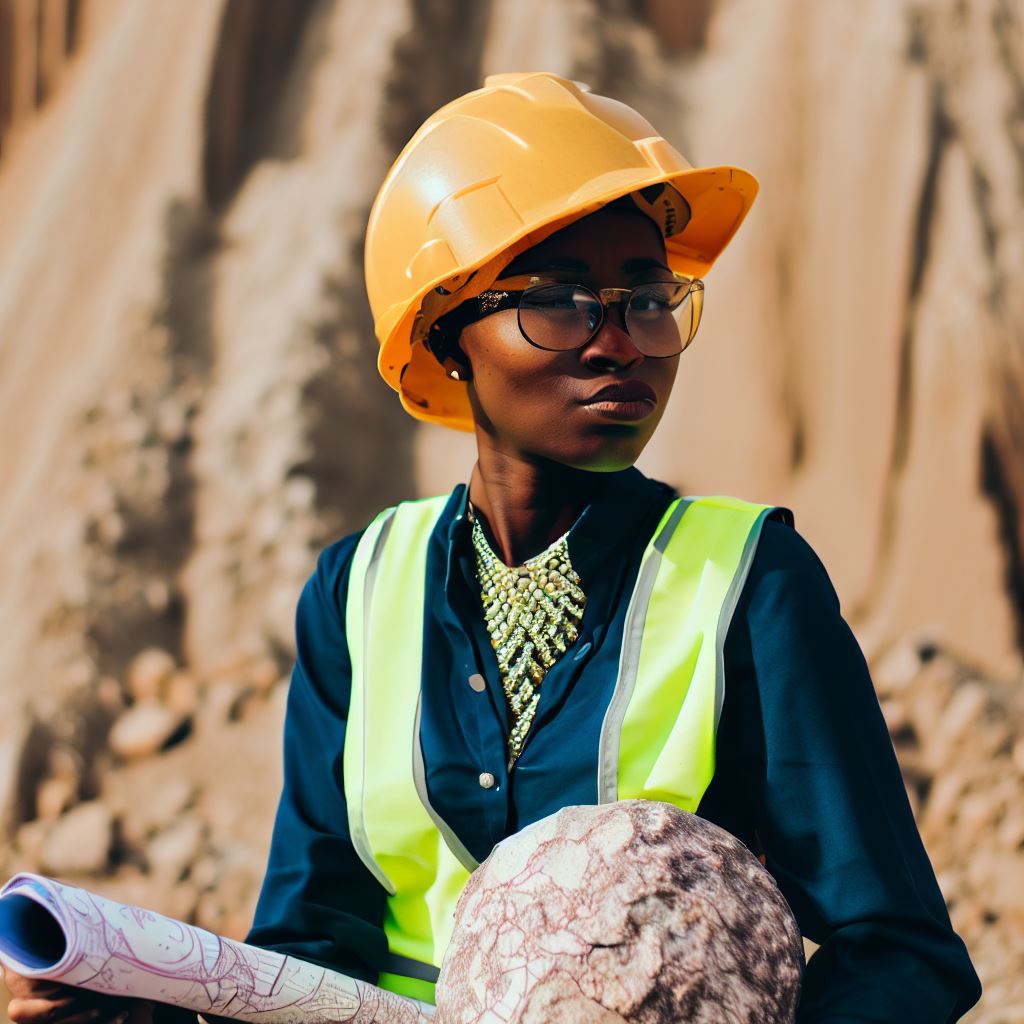Introduction
Networking is a vital aspect of a geologist’s career in Nigeria. Building connections and relationships within the industry is key to success.
In this section, we will explore essential networking tips for geologists working in Nigeria, a country rich in geological diversity and opportunities.
Whether you’re a seasoned professional or just starting your geological journey, effective networking can open doors to new projects, collaborations, and career advancements.
Nigeria’s geology sector is dynamic, with numerous projects in mining, oil and gas, environmental consulting, and academia.
This section offers practical advice on expanding your network, forming meaningful connections with peers and mentors, and utilising networking opportunities like conferences, seminars, and industry events.
By the end of this section, you will be equipped with the knowledge and confidence to navigate the Nigerian geology landscape through effective networking.
Understanding the Nigerian Geology Industry
Provide an overview of the geology industry in Nigeria
The geology industry in Nigeria is a crucial sector that contributes significantly to the nation’s economy.
Geologists play a vital role in exploring and exploiting the vast natural resources found in the country.
Nigeria is blessed with abundant mineral resources such as crude oil, natural gas, coal, limestone, and solid minerals, making it a lucrative field for geologists.
Geologists in Nigeria are involved in various activities, including geological mapping, mineral exploration, groundwater assessment, environmental impact assessment, and geotechnical studies.
They work in government agencies, private companies, and research institutions, contributing to the sustainable development of the nation’s natural resources.
The current challenges and opportunities for geologists in the country
Despite the abundance of opportunities, Nigerian geologists face several challenges in their profession.
One of the significant challenges is the lack of adequate infrastructure and resources for geological exploration.
Limited funding, inadequate laboratory facilities, and outdated equipment hinder effective research and exploration activities.
Another challenge is the impact of climate change and environmental degradation on the geology industry.
Increased rainfall, flooding, and erosion pose significant threats to geological formations, making it essential for geologists to find innovative solutions to mitigate these effects.
Furthermore, there is a lack of coordination and collaboration among geologists and other stakeholders in the industry.
This hinders the sharing of knowledge, experiences, and best practices among professionals.
To overcome these challenges, geologists must actively engage in networking and knowledge-sharing platforms.
Despite the challenges, there are numerous opportunities for geologists in Nigeria.
With the world’s growing demand for energy and mineral resources, the country offers vast potential for exploration and exploitation.
Geologists have the chance to make significant discoveries and contribute to the overall national development.
Additionally, the government of Nigeria is actively promoting the diversification of the economy, emphasising the development of solid minerals.
This presents an excellent opportunity for geologists to contribute their expertise in mineral exploration and help harness the vast potential of the country’s solid minerals sector.
Moreover, the Nigerian geology industry is increasingly becoming more technology-driven.
The geology industry in Nigeria offers vast opportunities for professionals looking to contribute to the sustainable development of the country’s natural resources.
Despite the challenges, geologists can overcome them by actively networking, staying updated on technological advancements, and collaborating with stakeholders.
By doing so, geologists will play a vital role in shaping the future of the Nigerian geology industry.
Identifying Key Networking Opportunities
The importance of attending conferences, seminars, and workshops
- Attending conferences, seminars, and workshops provide valuable networking opportunities for geologists.
- These events bring together professionals and experts from various fields within the geology industry.
- By attending such events, geologists can stay updated on the latest advancements, trends, and techniques in their field.
- Networking with fellow geologists at these events can lead to collaborations, partnerships, and career growth.
- It is essential to actively engage in discussions, ask questions, and exchange contact information to maximize networking opportunities.
- Conferences, seminars, and workshops also offer platforms for geologists to showcase their research and expertise through presentations.
- This exposure can enhance their professional reputation and expand their network.
- Geologists should make an effort to present their work and attend sessions relevant to their areas of interest.
- Building connections with industry leaders, potential employers, and colleagues can open doors to new job opportunities.
- Attending these events demonstrates a proactive approach towards professional development and staying connected with the geology community.
Professional organisations and associations geologists can join for networking
- Professional organizations and associations provide excellent platforms for networking and building industry connections.
- Geologists should consider joining relevant organizations such as the Nigerian Association of Petroleum Explorationists (NAPE).
- NAPE organizes events, conferences, and workshops specifically tailored for geologists in Nigeria.
- Through NAPE, geologists can network with industry professionals, gain access to job listings, and stay updated on industry trends.
- Other associations, such as the Nigerian Mining and Geosciences Society (NMGS), also provide networking opportunities.
- These organisations often have local sections or branches that hold regular meetings and events.
- Geologists can actively participate in these meetings, contribute to discussions, and exchange knowledge and experiences.
- Online platforms, such as LinkedIn, can also be utilized to connect with fellow geologists in Nigeria and beyond.
- Creating a professional profile on LinkedIn and joining relevant geology groups can expand networking possibilities.
- It is important to engage with others’ posts, share valuable content, and reach out for virtual collaborations or informational interviews.
Geologists in Nigeria can enhance careers, stay updated, and build networks by seizing opportunities at conferences, seminars, workshops, and professional organisations.
Read: The Role of Women in Nigerian Biochemistry
Building a Strong Professional Network
Tips on how to establish meaningful connections with industry professionals
- Attend industry conferences and events to meet fellow geologists and professionals in Nigeria.
- Introduce yourself confidently and make a good first impression by showcasing your expertise and enthusiasm.
- Be genuinely interested in the work and achievements of others, and ask engaging questions.
- Show professionalism by dressing appropriately and maintaining a positive attitude.
- Actively listen to others, demonstrate empathy, and show that you value their opinions and experiences.
- Participate in group discussions and contribute your knowledge to demonstrate your expertise.
- Seek out opportunities to collaborate or work on projects with other professionals.
- Share your experiences and relevant insights to establish yourself as a valuable member of the geology community.
- Be authentic and genuine in your interactions, as people are more likely to connect with the real you.
- Follow up after networking events by sending personalized emails to express your gratitude and continue the conversation.
Significance of exchanging contact information and following up after networking events
- Exchange business cards or contact information with professionals you meet to stay connected.
- Send a timely follow-up email or message to express your appreciation for meeting and to reinforce your interest in further communication.
- Personalize your follow-up messages by referring to specific topics discussed during the networking event.
- Offer assistance or resources related to their work or projects to show your value and willingness to contribute.
- Schedule follow-up meetings or calls to discuss potential collaborations or future opportunities.
- Stay connected through professional networking platforms such as LinkedIn to expand your network and stay in touch.
- Attend follow-up events or meetings to nurture and strengthen the connections you have made.
- Keep track of your network by organizing contact information and setting reminders for follow-ups.
- Provide support and be a resource to your connections whenever possible.
- Continuously grow and expand your network by attending ongoing industry events and building new relationships.
Building a strong professional network is essential for geologists working in Nigeria.
Geologists can establish meaningful connections by following these tips and emphasising contact exchange and post-event follow-up.
This opens doors to new opportunities with industry professionals.
Read: Nigerian Biochemists: Success Stories
Leveraging Social Media Platforms
The Role of Social Media in Networking for Geologists
- Social media plays a vital role in networking for geologists in Nigeria.
- Platforms like LinkedIn, Twitter, and Facebook provide opportunities to connect with professionals in the industry.
- Geologists can join relevant groups and communities to share knowledge and experiences.
- Social media allows geologists to stay updated on the latest trends, research, and job opportunities.
- Building a strong online presence can enhance professional reputation and increase visibility in the field.
Tips for Creating a Professional Online Presence and Engaging with Relevant Communities
- Choose a professional profile picture that represents your expertise and conveys a sense of professionalism.
- Craft a compelling bio that highlights your geology experience, qualifications, and areas of expertise.
- Use keywords related to geology in your profile and posts to optimise searchability.
- Share valuable content like research findings, industry news, and useful resources to establish yourself as an authority in the field.
- Engage with relevant communities by commenting on posts, asking questions, and sharing insights.
- Connect with other geologists, mentors, and industry experts to expand your professional network.
- Attend virtual conferences, webinars, and workshops related to geology and share your participation on social media platforms.
- Utilize hashtags relevant to geology when posting, as it increases visibility and helps target specific audiences.
- Engage in conversations with geologists and professionals in related fields to exchange ideas and broaden your knowledge.
- Maintain a consistent posting schedule to stay active and visible within your network.
- Share career achievements and success stories to inspire and motivate others in the industry.
Leveraging social media platforms is crucial for networking and professional growth for geologists in Nigeria.
By creating a strong online presence and engaging with relevant communities, geologists can enhance their visibility, stay updated on industry trends, and connect with industry professionals to further their careers.
Read: Challenges Faced by Nigerian Biochemists

Establishing Mentorship and Collaboration
The Benefits of Having Mentors in the Geology Industry
- Gain valuable insights and guidance from experienced professionals who have navigated similar challenges.
- Accelerate your learning by tapping into their knowledge and expertise.
- Receive career advice and development opportunities to enhance your professional growth.
- Expand your network through the mentor’s connections and increase your visibility in the industry.
- Gain access to opportunities not readily available to others, such as research projects or industry partnerships.
Ways to Find and Build Relationships with Experienced Professionals
- Attend industry events, conferences, and seminars, where you can meet and connect with experienced professionals.
- Join professional associations and organisations related to geology to network with professionals in the field.
- Utilise online platforms, such as LinkedIn, to identify and reach out to potential mentors.
- Participate in geology forums and online communities to connect with experts and seek guidance.
- Reach out to your university’s alumni network to find geologists who are willing to mentor and share their experiences.
- Seek opportunities for collaboration on research projects or fieldwork, which can lead to mentorship relationships.
- Attend workshops and training programs where you can interact with industry experts and establish connections.
- Engage in informational interviews with experienced professionals to learn about their career paths and gain insights.
- Volunteer for industry-related initiatives or projects to meet and learn from seasoned geologists.
- Become a mentee in structured mentorship programs offered by geology-related organizations or companies.
In the geology industry, having mentors can bring numerous benefits to your professional journey.
Mentors are experienced professionals who can provide valuable guidance, support, and knowledge based on their own successful careers.
Read: Salary Overview: Biochemists in Nigeria
Networking Dos and Don’ts
Dos for Effective Networking in the Nigerian Geology Industry
- Be proactive in attending industry events and conferences to expand your professional network.
- Build relationships with fellow geologists by engaging in conversations and actively listening to their experiences.
- Utilize social media platforms, such as LinkedIn, to connect with professionals in the geology field.
- Invest time in building a strong online presence, showcasing your expertise and relevant projects.
- Offer help and support to your connections whenever possible, fostering mutually beneficial relationships.
- Attend geology-specific workshops and seminars to enhance your knowledge and expertise.
- Participate in professional organizations and associations related to geology to expand your network.
- Maintain a positive and professional demeanor when interacting with colleagues and potential connections.
- Follow up with individuals you’ve met at networking events to strengthen connections and explore potential collaborations.
- Be open to mentorship opportunities and seek guidance from experienced professionals in the industry.
Common Mistakes to Avoid When Networking in the Field:
- Avoid monopolising conversations and instead, ask questions and show genuine interest in others’ experiences.
- Don’t underestimate the power of networking with individuals at different career stages, including students and early-career professionals.
- Avoid being too sales-focused or overly self-promotional during networking interactions.
- Don’t solely focus on your own needs and goals; instead, offer help and support to others.
- Avoid being too aggressive or pushy when seeking opportunities or making requests.
- Don’t neglect to follow up with contacts or connections made during networking events.
- Avoid being complacent; continuously work on expanding and nurturing your professional network.
- Don’t limit yourself to networking within the geology field; explore interdisciplinary connections as well.
- Avoid dismissing networking opportunities outside of formal events, as informal connections can be valuable.
- Don’t ignore the importance of maintaining relationships with existing connections; nurture and strengthen them.
Networking is a valuable tool for geologists working in Nigeria to expand their professional opportunities and develop fruitful collaborations.
By following the dos and avoiding common networking mistakes, geologists can establish a strong network that contributes to their career growth and success in the Nigerian geology industry.
Sustaining and Expanding Your Network
Tips on maintaining and strengthening professional relationships over time
- Regularly communicate with your professional contacts through emails, phone calls, or video conferences.
- Schedule face-to-face meetings whenever possible to build a stronger connection and trust.
- Attend scientific conferences, workshops, and seminars to meet colleagues and stay updated with industry trends.
- Share knowledge and resources with your network to demonstrate your expertise and value.
- Follow up after meetings, conferences, or collaborations to express gratitude and keep the communication alive.
- Engage with your network on social media platforms by liking, commenting, and sharing their professional posts.
- Offer your support and guidance whenever a member of your network needs assistance.
- Send personalised messages on occasions like birthdays, work anniversaries, or promotions to show that you care.
- Seek feedback and advice from your network to improve your skills and professional growth.
- Collaborate on research projects or publications to strengthen your bond and establish credibility in your field.
Strategies for expanding networks within and outside Nigeria
- Join professional organisations related to geology in Nigeria such as the Nigerian Mining and Geosciences Society (NMGS).
- Attend local geology conferences, symposiums, and workshops to connect with professionals within the country.
- Volunteer in community-based projects or environmental initiatives to meet like-minded individuals and expand your network.
- Participate in international conferences and seminars to meet geologists from around the world.
- Utilise online platforms like LinkedIn and ResearchGate to connect with geologists outside Nigeria.
- Engage in interdisciplinary collaboration to broaden your network across different fields of expertise.
- Explore opportunities for short-term study or work abroad to establish connections with geologists from different countries.
- Be open to mentorship opportunities and seek guidance from experienced geologists both locally and internationally.
- Utilise online forums and discussion groups to connect with geologists who share similar research interests.
- Attend geology field trips and expeditions to interact with professionals and researchers from diverse backgrounds.
Expanding and sustaining your network as a geologist working in Nigeria requires effort and continuous engagement.
By following these tips and strategies, you can strengthen professional relationships, gain valuable experiences, and create opportunities for collaboration and growth.
Remember, networking is not just about reaching out, but also about maintaining and nurturing those connections for long-term success.
Conclusion
Effective networking is the cornerstone of success for geologists in Nigeria. Building and nurturing professional relationships can lead to exciting opportunities, collaborations, and career growth.
We’ve explored valuable tips for expanding your network, making meaningful connections, and leveraging opportunities like conferences and seminars.
These strategies are crucial in a dynamic field like geology, where knowledge sharing and collaboration are paramount.
Remember, networking isn’t just about what you can gain but also what you can contribute to the geological community.
By actively participating in events, mentoring aspiring geologists, and staying updated with industry trends, you can leave a lasting impact on Nigeria’s geological landscape.
So, go ahead and put these networking tips into practice.
With dedication and a proactive approach, you’ll not only advance your geology career but also contribute to the growth and development of the field in Nigeria. Happy networking!




